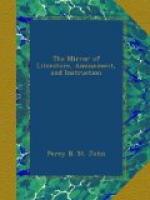REMEMBRANCE.
I recollect my happy home,
My pleasures as a child;
The forest where I used to roam,
The rocks so bleak and wild.
That home is tenantless; the spot
It graced is rude and bare;
The lov’d ones gone, our name forgot.
And desolation there.
Forget Me Not—1829.
In how many thousand hearts will this lament find an echo!
* * * * *
The Gatherer
A snapper up of unconsidered trifles.
SHAKSPEARE.
* * * * *
QUID PRO QUO.
A canon of the cathedral of Seville, who was very affected in his dress, and particular in his shoes, could not in the whole city find a workman to his liking. An unfortunate shoemaker to whom he applied, after quitting many others, having brought him a pair of shoes which did not please his taste, the canon became furious, and seizing one of the tools of the shoemaker, gave him with it so many blows on the head, that the poor shoemaker fell dead on the floor. The unhappy man left a widow, four daughters, and a son fourteen years of age, the eldest of the indigent family. They made their complaints to the chapter; the canon was prosecuted, and condemned not to appear in the choir for a year.
The young shoemaker, having attained to man’s estate, was scarcely able to get a livelihood; and overwhelmed with wretchedness, sat down on the day of a procession at the door of the cathedral of Seville, in the moment the procession passed by. Among the other canons he perceived the murderer of his father. At the sight of this man, filial affection, rage, and despair got so far the better of his reason, that he fell furiously on the priest, and stabbed him to the heart. The young man was seized, convicted of the crime, and immediately condemned to be quartered alive. Peter, whom we call the cruel, and whom the Spaniards, with more reason, call the lover of justice, was then at Seville. The affair came to his knowledge, and after learning the particulars, he determined to be himself the judge of the young shoemaker. When he proceeded to give judgment, he first annulled the sentence just pronounced by the clergy; and after asking the young man what profession he was, “I forbid you,” said he, “to make shoes for a year to come.”
* * * * *
When Demetrius conquered the city of Magara, and every thing had been plundered by his soldiers, he ordered the philosopher Stilpon to be called before him, and asked him whether he had not lost his property in this confusion? “No,” replied Stilpon, “as all I possess is in my head.”
* * * * *




